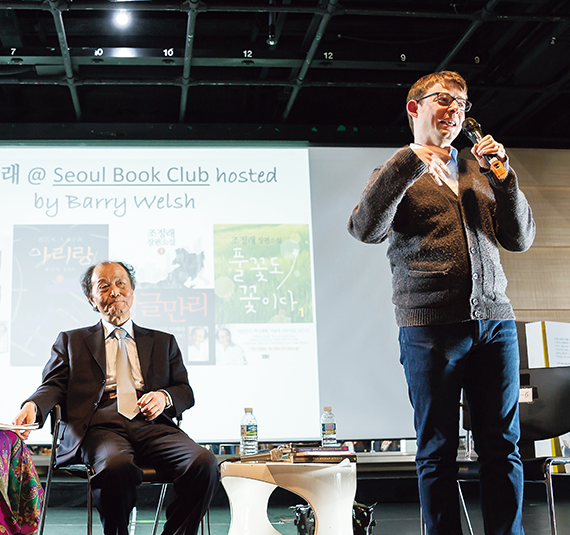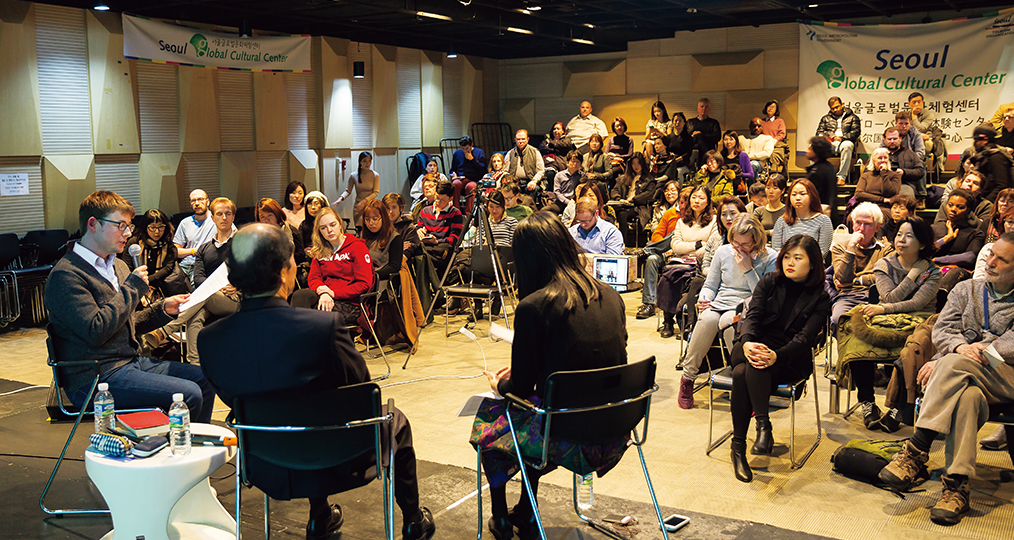Since he came to Korea to teach English at a middle school, Barry Welsh has become acquainted with Seoul,difficult and unfamiliar at first, mostly through books and movies. These days, when he invites a famous author tohis monthly “book talk concert,” the 200-seat hall is filled to capacity.

Barry Welsh of the Seoul Book and Culture Club speaks to the audience at a “talkconcert” featuring novelist Jo Jung-rae, seated at left, as guest speaker. Welsh is currentlyan assistant professor of English speaking and writing at Dongguk University.
One day in early January, foreign residents of Seoul arrivedone by one to fill the 200-seat hall of the Seoul Global CulturalCenter in Myeong-dong, downtown Seoul. They hadcome for the Seoul Book and Culture Club event hosted by BarryWelsh, a Brit living in Seoul. The guest writer that day was Jo Jungrae,author of “Taebaek Mountain Range,” “The Han River,” and“The Great Jungle.” “Taebaek Mountain Range,” his masterpiece, isa saga consisting of 10 volumes. Selling more than 10 million copiesso far, the novel is regarded as an iconic work of Korean literaturethat delves into the unresolved problems of national divisionand ideological conflict in modern Korean history. It is among themost sought-after books at university libraries.Long-cherished HobbiesThe event lasted two hours. During the first part, Jo and Welshtalked with the help of an interpreter. Characteristically, the veteranwriter covered a wide range of topics from the high-handednessof world powers to nationalism and the immorality of politicians.Despite the weightiness of the subjects, the audience wasengrossed in the dialogue. The second part was a question andanswer session. Hands shot up here and there. A young womanfrom New York asked a question.
Welsh looked a little embarrassedand grinned awkwardly when Jo spoke accusingly of Britain’s colonialdomination around the world over two centuries.
The event came to a close, and Welsh presented Jo with a bottleof single malt whisky he had brought from his hometown in Scotland.
“I’m a Brit. Not English, but Scottish,” Welsh said. “You know‘Braveheart’ [1995 film depicting the Scottish War of Independence],don’t you? The lead character was in the same position asAdmiral Yi Sun-sin portrayed in ‘Roaring Currents’ [2014 Koreanwar film, aka ‘Myeongnyang’]. So I can fully understand the grudgepeople have against invaders.”
Welsh’s book club is well-known to foreigners in Seoul. Since itwas launched in 2011, the club has hosted an event once a month.Many of the regular participants have come to know each other andnaturally linger afterwards to say hello. It appears the membershipof the book club overlaps with that of the Seoul Film Society Welshlaunched in 2013.
“We’re lucky to have Mr. Jo at our event today. He uses neithera home phone nor a mobile phone, but can be reached only by fax.And he rarely attends outside gatherings,” Welsh said.
In October last year, Welsh wrote an article for a local newspaperin which he expressed the hope that more works by Jo —which deal with Korean history and culture and can help peoplefrom other countries understand what historical influences haveshaped Koreans — would be translated into foreign languages. Jo,who had read the article, gladly accepted the invitation to speak atthe book club. Moreover, Jo declined the honorarium, which madeWelsh happy because the proceeds from admission fees (5,000 wonper person) were just enough to pay the interpreter's fee and otherexpenses. Any money that is left is spent on the film society screeningsfor which admission is free.
Welsh currently teaches English speaking and writing as anassistant professor at Dongguk University. “The book club and thefilm screenings are my long-time hobbies,” he said. “I plan, implement,and promote each and every event by myself. Of course, mywife helps me. I’m fortunate in being able to rent such a good hallfrom the Seoul Metropolitan Government for free. And it’s veryrewarding to meet good people.”
Setting Out on his Journey
Welsh majored in English literature at the University of Liverpooland obtained an M.A. in film studies at the University of Edinburgh.In 2008, when he was working for an investment company on theIsle of Man, the global financial crisis left his career unstable. Hedecided to teach English in Asia for a year or two and save somemoney before traveling around the world and returning home. Hestumbled upon a job opening for a native English speaker in Koreawith attractive terms and conditions. He applied and landed the jobat a middle school in Seoul. The school provided him with airfareand housing. He arrived in Korea for the first time in August 2009.
“I was under enormous pressure when I was working for theinvestment firm. I had no days off and the work was hard. Here atthe school, I got off work at 4:30 p.m. sharp every day. And I likedteaching. Besides, the transport was convenient, stores were opentill late at night, and it was fun to hike up the mountains in the surroundingarea on weekends,” Welsh said.
Having lived on his own since he was 18, adapting to a foreigncountry when he was over 30 was not too difficult. But he neededsome time to get familiar with a new city.
“As I was intimidated by the scale of Seoul and its modern chicwas beyond imagination, I didn’t go out much for a while,” Welshsaid. “My life consisted of working at the school, reading at a cafénear my home after work, and then going home to sleep. Then Iplucked up courage and started to explore the city little by little.”

The audience listens to Barry Welsh during his book club meeting held at the SeoulGlobal Cultural Center in downtown Seoul. This event is posted on Welsh’s Facebook.
After his contract with the middle school expired, Welsh workedas a visiting professor at Lingua Express, the language educationinstitute at Sookmyung Women’s University. In January 2013,he fell in love with a woman named Roh Hyun-ui to whom he wasintroduced by one of his colleagues. She was working for a tradingcompany after graduating from the university’s English LiteratureDepartment. Like him, she loved literature and films and playingwith her cat at home. They could trust each other and felt they weremeant for each other. But he suffered for a while because her parentsdid not agree with their daughter’s choice of husband.
Welsh said, “I said nothing to try to win them over, like howI would buy a house, what my goals for the future were, or thatthey wouldn’t regret their decision to let their daughter marry me.Instead, I just asked them to respect our decision. This made herparents a little uneasy. That was just due to cultural differences. Weare all happy and respect one another now, of course.”
They married in 2015. An English-speaking docent at the ICTExhibition Hall of Digital Pavilion in northwestern Seoul, Roh Hyunuialso helps him run the book and film clubs. Earlier, Welsh dideverything by himself, including posting announcements about clubevents in English because he did not know Hangeul. But, with hiswife's help, he started making announcements in Korean, too. Thisattracted Koreans to the club events and their participation hasenriched the dialogue between invited authors and the audience.
“I didn’t know foreigners in Seoul had such great interest in Korean literature. I also realized thatan event with an invited author is a very effective way of helping them understand the author'sworks and literary world.”

Roh Hyun-ui is an important contributor to the operation of Welsh’s book and film clubs.
Talks with Authors
The first Korean literary work Welsh read was “I Have the Rightto Destroy Myself,” a novel by Kim Young-ha. He was attracted bythe title, and enchanted by its hypermodern style and theme. Hegathered a few friends to start a reading club, believing that theywould also like the novel. At first, he chose prominent novelsand hosted debates on the works, never thinking of inviting theirauthors. Then one day, he invited Krys Lee, a Korean-Americanauthor and professor at Yonsei University whom he had cometo know through Facebook, to a small-scale event at the SeoulGlobal Cultural Center. The topic was “Drifting House,” Lee’sfirst collection of short stories. Welsh was astonished to see asmany as 200 people turn up for the event. His next guest wasShin Dong-hyuk, a former North Korean writer who defected toSouth Korea.
“I didn’t know foreigners in Seoul had such great interest inKorean literature. I also realized that an event with an invitedauthor is a very effective way of helping them understand theauthor's works and literary world,” Welsh said.
Subsequently, a galaxy of star authors has been invited to theevents. Once he had succeeded in inviting Kim Young-ha, therest came naturally. “When I mentioned that Kim Young-ha hadparticipated in one of my events, everything became very easyall of a sudden,” Welsh said with a smile.
Renowned authors featured so far include poet Ko Un, novelistsGong Ji-young, Hwang Sok-yong, Han Kang, Lee Changrae,and Shin Kyung-sook, and children’s story writer HwangSun-mi. Welsh was elated when Han Kang won the Man BookerInternational Prize for “The Vegetarian” soon after her bookclub appearance in 2016. Hwang Sok-yong kept the audiencelaughing to the end and Ko Un mesmerized the audience withhis passionate poetry recitations.
Welsh said he was impressed by such Korean novels as “Onthe Road to Sampo” by Hwang Sok-yong, short stories by PyunHye-young and Park Min-gyu, “The Vegetarian” by Han Kang,and “Modern Family” by Cheon Myeong-kwan.He not onlylikes the novel “On the Road to Sampo,” but also counts its filmadaptation as one of his top five favorite movies.
Though immersed in Korean literature and films, he stilldepends largely on translations for literary works and on subtitlesfor films. To improve his Korean, he keeps taking lessons.“I don’t know what other adventures I’ll have while livinghere with my wife,” Welsh said. “Life is what happens whileyou're busy making other plans, as John Lennon once said in a2 song.”